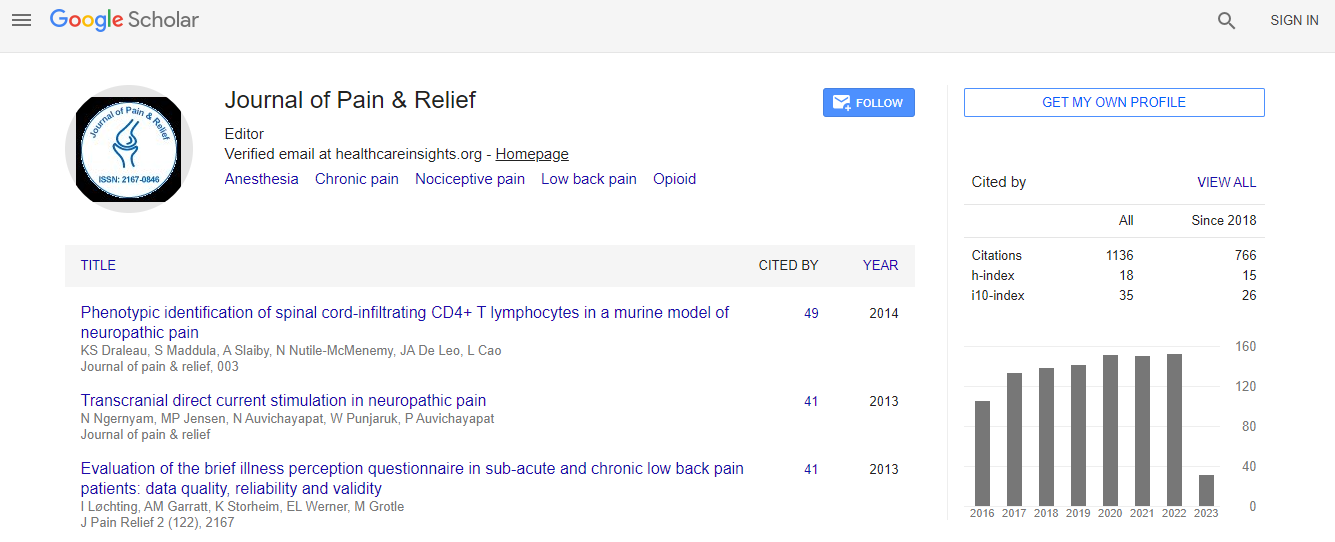Our Group organises 3000+ Global Conferenceseries Events every year across USA, Europe & Asia with support from 1000 more scientific Societies and Publishes 700+ Open Access Journals which contains over 50000 eminent personalities, reputed scientists as editorial board members.
Open Access Journals gaining more Readers and Citations
700 Journals and 15,000,000 Readers Each Journal is getting 25,000+ Readers
Google Scholar citation report
Citations : 1583
Journal of Pain & Relief received 1583 citations as per Google Scholar report
Journal of Pain & Relief peer review process verified at publons
Indexed In
- Index Copernicus
- Google Scholar
- Open J Gate
- Genamics JournalSeek
- Cosmos IF
- RefSeek
- Hamdard University
- EBSCO A-Z
- OCLC- WorldCat
- Publons
- Geneva Foundation for Medical Education and Research
- Euro Pub
- ICMJE
Useful Links
Recommended Journals
Related Subjects
Share This Page
Peer volunteerism: Does it help in managing pain?
7th International Conference and Exhibition on Pain Research and Management
Mimi M Y Tse
Hong Kong Academy of Nursing, Hong Kong
Posters & Accepted Abstracts: J Pain Relief
Abstract
Background: Chronic non-cancer pain is common among older adults and is often associated with significant physical and psychosocial incapacities. Older adults with pain are more depressed, anxious, and have reduced social interaction. Pain in older adults tends to be constant in nature, moderate to severe in intensity, and years long in duration. Prevalence of pain among nursing home residents is as high as 70%-80%. Nursing home residents are physically frail, live in closed nursing home environments, and may have difficulty seeking pain management strategies. Aim: To recruit and train peer volunteers (PVs) to lead pain management program targeting the older adults living in nursing homes Design: A pre-post experimental study Method: A total of 45 peer volunteers were recruited from the Institute of Active Ageing, hosted by the Faculty of Health and Social Sciences of The Hong Kong Polytechnic University in the past few years. They completed the pain management training and visited older adults living in nursing homes that suffered from chronic pain. The pain management education program included physical exercises, interactive teaching and sharing of pain management using non-pharmacological strategies. Results: The pain management program helped the nursing home residents to learn ways to soothe the pain, reduce the pain intensity, enhance activity of daily living, and increase happiness. Peer volunteers showed a significant increase in self-rated pain management knowledge. Conclusion: Findings of this study indicate that education on pain self-management is essential. Due to the limited health care resources and budgets, training of laypersons provides an opportunity for them to transfer pain self-management knowledge to nursing home residents.Biography
E-mail: mimi.tse@polyu.edu.hk

 Spanish
Spanish  Chinese
Chinese  Russian
Russian  German
German  French
French  Japanese
Japanese  Portuguese
Portuguese  Hindi
Hindi 
